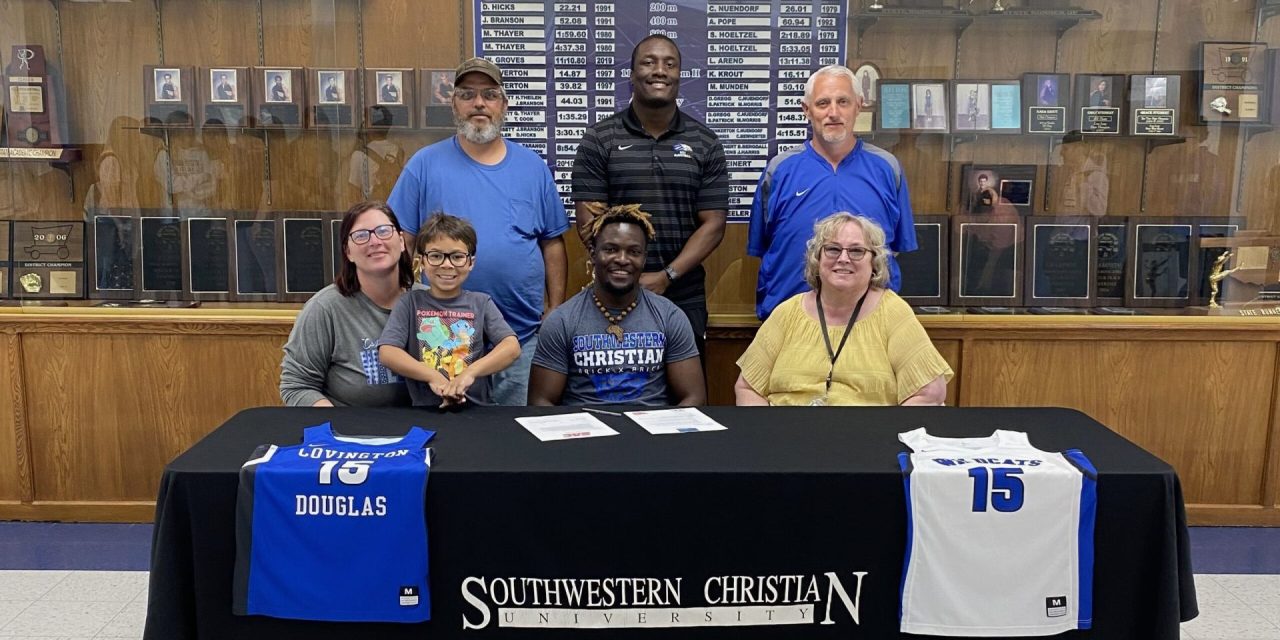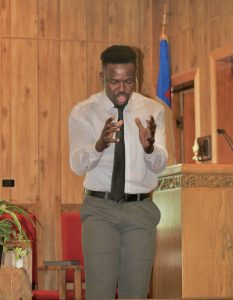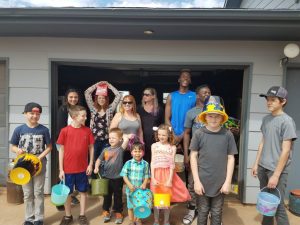Above: Gloire signed his letter of intent to play at Southwestern Christian University with Laura Neal at left, holding her grandson, Greyson. At right is Johnna Anderson, Neal’s mother. Back row, left to right, are David Neal, SCU coach Brandon Rollins and Covington-Douglas High principal Kenny Daugherty. Photo courtesy of Laura Neal
COVINGTON (BP) — Gloire Houmba remembers the poverty growing up in the Republic of Congo and his desperation to escape it. One way others had succeeded was through athletics, basketball in particular.
“My dad is a pastor, and my mom is a great Christian, so I grew up in a Christian family. But I wanted more for me and them and have a better education,” said Houmba, whose first name is pronounced “Glory.”
“I wanted to be successful to help them out of poverty,” he said. “So, at the age of 7, I started to dream about leaving the country. I started playing basketball.”
Five years later, a countryman who had been playing the sport in the U.S. came back to visit. He went to some pickup games and noticed a 12-year-old darting around the court who also had leadership skills.
“He told me I was really good and asked if I wanted to get out of the country and play,” Houmba remembered. “Of course I said yes.”
That decision led Houmba to America’s capital city and what he thought was the first step toward realizing his dream. Instead, he wound up in a situation that was exploitation at best. At its worst, it was not far removed from slavery. His faith was tested.
But he would go on to find a home and family in rural Oklahoma. There, while still in high school, he and his brother would get a platform to proclaim Christ. Now serving as a student minister, Houmba’s testimony influences others in ways he couldn’t have imagined back then.
Alone in America
All young basketball players in Houmba’s country know the name Serge Ibaka, the first Republic of the Congo native to be drafted into the NBA. His career included a $48 million contract with the Oklahoma City Thunder in 2012 and an NBA championship with the Toronto Raptors in 2019.
Whereas Ibaka’s rise came through professional leagues in Europe, Houmba and his friend David Oyona Ibandzo became part of the large-scale exploitation of African-born players in America.
The challenges began before Houmba left his home country. He says his paperwork was in order, but nevertheless it took four attempts to pass the visa application process. Every attempt required fees.
Houmba, 15, and Ibandzo, 13, ended up in Washington, D.C., to play for what they were told was a Christian school (which Houmba said has since closed). Neither spoke English. They thought they were going to be housed together, but instead were separated.
“They told us it was because we would want to talk in French all the time and not learn English,” Houmba said. “I thought that made sense.”
Very little of their experience did, though. Houmba and Ibandzo told Baptist Press they were denied or given little food while expected to play in highly competitive tournaments, as many as four games a day. Houmba lived with his coach for three months where his bed was a small couch not long enough for him to lie down on.
At one point, Houmba said, all the players from Africa were taken to a hotel room and left there for three days with no food or money to buy any. They drank water from the faucet and mixed it with sugar for energy.
Finally, Houmba and Ibandzo reached out to a friend and fellow basketball player, Saladine Ganda, for help. He invited them to come to California. The boys told their coach, who protested their leaving, that it was only to visit a friend. They left all belongings behind except what could fit in a backpack.
The reality is that it was an escape.
Ganda had gone to school in northern Oklahoma and knew someone who could help. He talked to Laura Neal, a member of Covington, First, who talked to her husband, David, about it. They prayed over the matter and later that summer when Neal drove Ganda the 20 hours from Covington to La Sierra University in California, she brought Houmba and Ibandzo back with her.
Arrival in Oklahoma
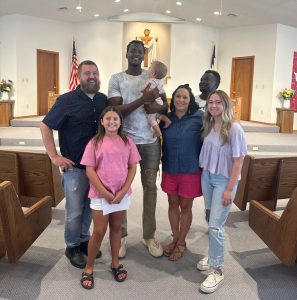
Gloire Houmba and David Ibandzo stand with Pastor Phillip Gregg of Covington, First and his family. Photo courtesy of Laura Neal
Ganda, also from Republic of the Congo, had become friends with a classmate at Northern Oklahoma College named Tyler Bowman. Through that came Ganda’s connection with Covington, First, as well as an extended church family with Reydon, First through annual trips to Falls Creek Conference Center.
He also joined a group of several international basketball players who became friends with the Neals to the point of calling them mom and dad.
The Neals would become guardians to Houmba and Ibandzo. The boys had kept word of their plight in D.C. from their parents in order to not worry them. Oklahoma brought security, but also its share of adjustments.
“Gloire and I had been praying for a loving family in America,” Ibandzo said. “We had been praying to the Lord for that.”
If you’re a kid outside of the U.S., TV makes you think everywhere is a big city like New York. That was definitely not the case here.
“Instead, we’re on a small farm. It was a shock,” Ibandzo said. “There was work to do. I was a city boy and had never fed pigs and cows in my life, picked up eggs or butchered chickens. At first I was grossed out by that, but I got used to it.”
The boys were not only the only Africans at Covington-Douglas High School, but the only Black students. Early on, Houmba was approached by classmates to go to parties, drink and smoke. He told them he didn’t do those kinds of things, which brought racist comments.
His and Ibandzo’s response, though with no words, spoke volumes.
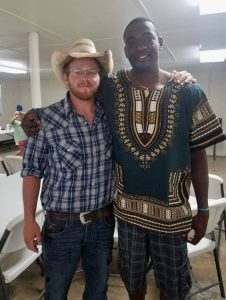
Saladine Ganda stands with Gabe Cavazos, a deacon at Reydon, First, while at Falls Creek. Photo courtesy of Phillip Gregg
“In the midst of that, I just stayed positive,” said Houmba. “People were like, ‘This dude is different.’ That’s where people started respecting me.”
When they arrived, Houmba was a freshman while Ibandzo was a 6’5” seventh grader. They would eventually become stars at the high school – on the court, but also in the classroom and at church. They became known not just for basketball, but for working hard at their grades and being respectful toward adults.
Athletic success came. After Houmba’s sophomore year, he was selected to the most prestigious AAU team in the state, which was sponsored by NBA great Blake Griffin. His team won the top Nike camp in the country that year, he said, where he faced several future NBA players like the Indiana Pacers’ Kendall Brown and the Portland Trail Blazers’ Shaedon Sharpe.
Houmba also set a school record at Covington-Douglas by passing 1,000 points his first two seasons. Full gyms saw more wins in that time frame than during any other in the school’s history as the Wildcats won the district championship his senior year.
Houmba graduated as salutatorian before moving on to play at Southwestern Christian University in Bethany. He was also part of the worship team and served as a campus chaplain.
After two years he decided to transfer to Langston University to pursue a career in physical therapy. He commuted to school while living with the Neals.
Another path
People had noticed Houmba’s gift for public speaking with his salutatorian speech, and his faith was well-known. Covington, First pastor Phillip Gregg asked if he would like to preach. That led to asking him last summer if he would like to lead the youth.
“It’s been amazing and wonderful,” Houmba told BP. “We’ve grown from 20 kids to 30 or 50 at times. We have started small groups as well as our large group Bible study.”
Gregg has watched Houmba and Ibandzo grow with the support of others.
“Of course, the boys have their parents back home as well,” the pastor said, “but David and Laura have stewarded every moment with David and Gloire to the best of their ability. Their entire family has been a part of the process. Laura’s sisters Jackie, Teresa and Janelle as well as her mother and father have all been an extended family.”
Jackie—who in 2019 got a tattoo of Africa with a heart covering the place for Republic of the Congo—and her husband, Evan, flew to California to watch Ganda play for La Sierra. Ganda has since gotten married and still lives in the Golden State.
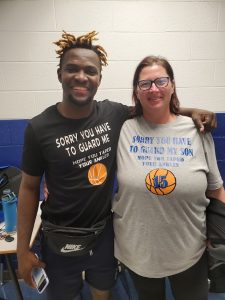
Basketball took Gloire Houmba, here with his American mother, Laura Neal, many places as well as giving him a platform to tell others about Christ. Photo courtesy of Laura Neal
Ibandzo is finishing his freshman season for the University of Texas Rio Grande Valley. Houmba, meanwhile, is working on his degree while doing youth minister things like planning a volleyball tournament this weekend.
He created a GroupMe to stay in touch throughout the week. If someone needs a ride to church, he gives one. The school superintendent, after getting some encouragement from Houmba a few weeks ago, opened the gym for kids to play.
During his dark times when he struggled in his faith, Houmba clung to Gal. 2:20 to remind himself to have the right perspective.
“As soon as I gave my life to Christ, it was no longer mine,” he said. “I live according to God. It’s a theme we teach to our students to be doers and not just hearers.
“I try to lead these kids by example. They know me and my story, how I’ve struggled at times. They know it wasn’t easy, and they understand and listen. They open up to me.
“It’s a beautiful thing.”


